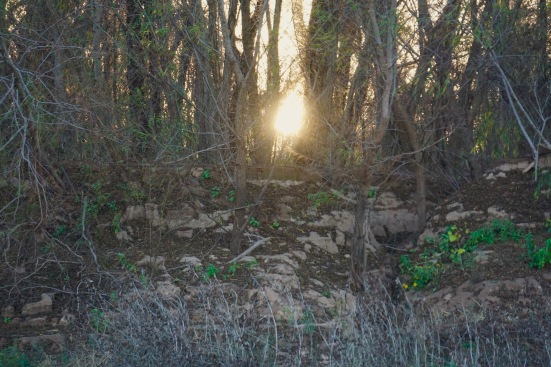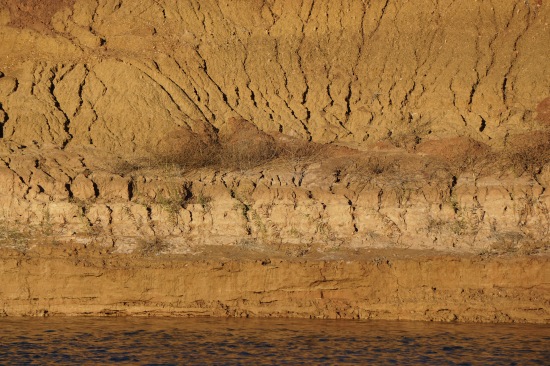“To him who in the love of Nature holds
Communion with her visible forms, she speaks
A various language . . .”
William Cullen Bryant “Thanatopsis” (1817)
It is hard to say whether Man or Nature is more subject to moods, and therefore whether Bryant’s “various language” originates in peculiarities of the tongue or of the ear. If silence can be taken as a sort of language—and there can be no doubt that silence is expressive, we cannot deny that Nature often withdraws into cold taciturnity, and that in this mood she appears as the beautiful but icy queen that I yesterday called la belle dame sans mercy.
And when Nature is in this mood, we cannot deny that we feel the aching misery of existential loneliness.
As Robert Frost complained to a lofty star, so we complain:
“. . . to be wholly taciturn
In your reserve is not allowed.”*
To which Frost’s star gave the wordless answer of its own example. It intimated that Frost should see it as the symbol of something that was lacking in himself. Thus, before we ask silly questions of a star, we should first see that,
“It asks a little of us here.”
Frost’s star did not ask him to assume all of the cold impassivity of la belle dame sans mercy, but it asked him to be “a little” more star-like in his detachment and serenity. Frost particularly mentions detachment from the passions by which “the mob is swayed / to carry praise and blame too far,” and since the poem was published in 1916, we may suppose he was thinking of the mob passions of the Great War.
But these are not the only passions Frost has in mind, as is clear from the allusion he makes to John Keats’ sonnet “Bright Star.” This opens with the line,
“Bright star! would I were steadfast as thou art.”**
But Keats at once explains that it is only the steadfastness of the star that he proposes to emulate. He will not withdraw into celestial detachment and look down on earth “like Nature’s patient sleepless Eremite,” but will only aspire to show star-like steadfastness while “pillow’d upon my fair love’s ripening breast.” In other words, he sees in the star a symbol of the constancy he lacks.
And thus, we begin to see how a star speaks what Bryant called “a various language.” To Frost it was a symbol of the serenity he lacked in the tumult of wartime; to Keats it was a symbol of the constancy he lacked in the transports of erotic love.
But what is most important is that the meaning of both symbols was tacit, and these stars therefore seemed absolutely taciturn to to anyone who assumed they were nothing but flaming balls of gas. I believe this is why Frost titled his poem, “Choose Something Like a Star.” Nature is allowed to be “absolutely taciturn in its reserve,” until we choose the path that Owen Barfield called participation.

Sun Over the Brazos Levee
* * * * *
It seems that Man and Nature are both subject to moods, by which I mean both modes of existence and swings of emotion. To explain the taciturnity of Nature, Ralph Waldo Emerson for instance suggested that she copies the possum and plays dead when men are trying to kill her. She seems cold and pitiless to cold and pitiless men, because she withdraws like the Old Narnians under Telmarine tyranny, into forests and caves and the deep sleep of trees.
As Doctor Cornelius explained to Prince Caspian,
“It is you Telmarines who silenced the beasts and the trees and the fountains, and who killed and drove away the Dwarfs and Fauns, and are now trying to cover up even the memory of them.”***
You may recall that these words were spoken atop a tower of the Telmarine fortress, to which Doctor Cornelius and the Prince had repaired in the dead of night to observe the conjunction of two planets, Tarva and Alambil. Since Telmarine Science had conditioned Caspian to gaze at the stars in a materialist mood, he sees them as objects and asks his tutor, “are they going to have a collision.” But Dr. Cornelius has Old Narnian blood in his veins, and therefore (like Frost and Keats) conceives of stars as symbols that can speak to those who have ears to hear. Thus, he corrects the Prince and says,
“Their meeting is fortunate and means some great good for the sad realm of Narnia.”
Telmarine Science is what Emerson called “Blight” in a poem of that name. He even makes the sidereal connection in these lines:
“We are strangers to the stars,
And strangers to the mystic beast and bird,
And strangers to the plant and to the mine.Ӡ
This estrangement is what later writers would call alienation, and what I described in yesterday’s post as the misery of unrequited love. Emerson opens his poem with the complaint that he is dying for want of an intimate connection to Nature.
“I am weary of the surfaces,
And die of inanition.”
He longs for deeper participation.
“O, that were much, and I could be a part
Of the round day, related to the sun
And planted world . . .”
But participation is prevented by the Blight of Telmarine Science.
“But these young scholars, who invade our hills,
. . .
Love not the flower they pluck, and know it not,
And all their botany is Latin names.”
If only, he laments, the world still had old scholars like Doctor Cornelius.
“The old men studied magic in the flowers,
And human fortunes in astronomy
. . .
Preferring things to names, for these were men,
Were unitarians of the united world.”
The united world must not be confused with materialist monism, for these old scholars (who were Men) saw something very much like themselves in the material world. The new scholars (who are machines) see something exactly like the material world in themselves. Speaking of the old scholars, Emerson says,
“And, wheresoever their clear eye-beams fell,
They caught the footsteps of the SAME . . .”
The word footsteps here means what we would call footprints, and here serves to recall that astonishing moment when the castaway Robinson Crusoe discovers that he is not alone on his “Island of Despair.”
“I was exceedingly surpriz’d with the Print of a Man’s naked Foot on the Shore, which was very plain to be seen in the Sand: I stood like one Thunder-struck, or as if I had seen an Apparition.”††
Emerson believed that our modern world of Telmarine Science is an “Island of Despair,” but that we caused our own shipwreck and brought our own Blight because we harried Nature into hiding, just as the Telmarines harried the Old Narnians into hiding. Thereafter, when anyone has looked for “footprints of the SAME,”
“The injured elements say, ‘Not in us;’
And night and day, ocean and continent,
Fire, plant and mineral say, ’Not in us;’
And haughtily return us stare for stare.”
Nature and the Old Narnians go into hiding when we choose,
“To invade them impiously for gain.”
Nature will yield material to materialistic men, but,
“The nectar and ambrosia, are withheld;
And in the midst of spoils and slaves, we thieves
And pirates of the universe, shut out
Daily to a more thin and outward rind,
Turn pale and starve.”

Sunset over the Brazos Levee
* * * * *
Nature speaks a various language “to him who in the love of Nature holds communion with her visible forms.” This is to say, to one who sees in Nature “footsteps of the SAME,” and who therefore understands that, although the meanings of Nature may be tacit, she is not “wholly taciturn.”
But when “thieves and pirates of the universe” invade her “impiously for gain,” and then look to her for meaning, she answers, “not in me.” Indeed, she takes her revenge and adds in a whisper, “not in you, either.” For she knows that men who disenchant Nature, must very shortly disenchant themselves. Having made themselves castaways on a lonely “Island of Despair,” they will very shortly find that they no longer leave “the Print of a Man’s naked Foot on the Shore.”
They will very shortly find that all the prints on the sand are animal tracks, because when men abolish spirit in Nature, they must abolished spirit in themselves!
This is what Emerson meant when he said that men who are
“ . . . . . . . . . . . . . . . . . . . . .Shut out
Daily to a more thin and outward rind,
Turn pale and starve.”
That “thin and outward rind” is the “cold hill’s side” to which Keats knight was expelled by la belle dame sans mercy. And you will recall that Keats’ knight turned pale, just like Emerson’s pirates, and that he was likewise “loitering” on the shore of death.

Willows across the Brazos
* * * * *
Ralph Adams Cram (1863-1942) was an American architect and author. A high church Anglican and medievalist, he specialized in ecclesiastical architecture and expositions of what he called sacramental philosophy. The two were related for Cram, since he believed that a church building was more than a decorated shed that kept the congregation out of the rain. When properly executed, it was a medium in which spiritual grace entered and transformed the world.
Like many traditional Christians, Cram believed that sacramental philosophy was “the essential system of Christianity” because “it follows inevitably from the fundamental doctrines of the Incarnation and the Redemption.”††† The word must become flesh and the flesh must become word.
Or as Cram put it,
“The material thing is deadly only when it is cut off from the spiritual thing; united, matter ennobled as an agent, spirit familiarized through its homely housing.”
Emerson told us that it is impious to cut material things off from spiritual things, to be like the young scholars of Telmarine Science who “love not the flower they pluck,” or like the “thieves and pirates of the universe” from whom “the nectar and ambrosia are withheld.” Cram tells us that this impiety is “deadly” because men turn pale and starve when they are deprived of the nectar of beauty and the ambrosia of grace.
If I live by Telmarine Science and say that there are no Old Narnians, and very likely were no Old Narnians, I must expect the “injured elements” to copy the possum and play dead. I must expect them to answer my search for meaning with the words “not in me.”
But if I listen closely, I must also expect them to take their revenge and whisper the curse of la belle dame san mercy:
“Not in you, either!”

Furrowed Bluff on the Brazos
*) Robert Frost, “Choose Something Like a Star” (1916)
**) John Keats, “Bright Star” (1819)
***) C. S. Lewis, Prince Caspian: the Return to Narnia (1951)
†) Ralph Waldo Emerson, “Blight” (1847)
††) Daniel Defoe, The Life and Strange Adventures of Robinson Crusoe of York, Mariner (1719)
††) Ralph Adams Cram, Gold, Frankincense and Myrrh (1919)

Pingback: The Blight of Telmarine Science | Reaction Times
Pingback: Cantandum in Ezkhaton 12/22/19 | Liberae Sunt Nostrae Cogitatiores
thank for the your patience. nice post.